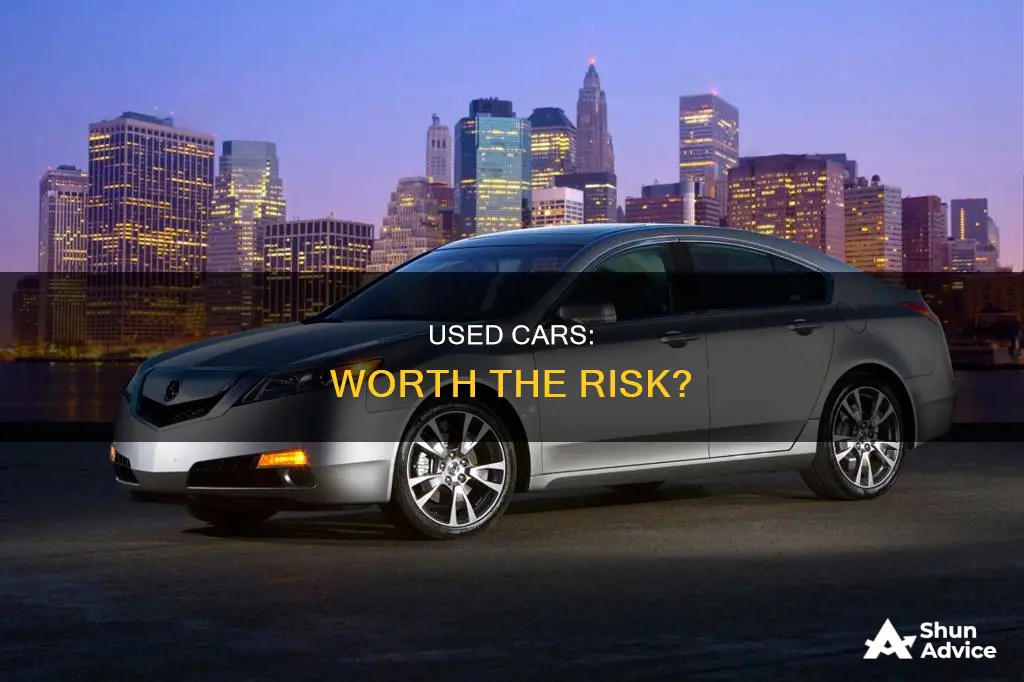
While buying a used car can be a good investment choice compared to buying a new car, there are still some risks involved. Used cars are generally more affordable, with lower monthly loan payments and insurance costs. They also experience slower depreciation, which is one of the most influential factors affecting a car's long-term value. However, used cars may require higher maintenance costs and it is important to check the car's history and have it inspected by a mechanic to avoid costly repairs.
| Characteristics | Values |
|---|---|
| Affordability | Used cars are typically more affordable than new cars. |
| Monthly Payments | Monthly loan payments for used cars are lower than for new cars. |
| Insurance Costs | Car insurance is generally cheaper for used cars. |
| Depreciation | Used cars experience slower depreciation than new cars. |
| Technology | Used cars may not have the latest technology. |
| Maintenance Costs | Used cars may require higher maintenance costs. |
| Vehicle History | It is important to check the vehicle history before buying a used car. |
What You'll Learn

Used cars are more affordable, but may have higher maintenance costs
Used cars are typically more affordable than new cars, but they may come with higher maintenance costs.
According to Experian's State of the Automotive Finance Market Report from Q3 2023, the average monthly loan payment on a new car was $726, compared to $533 for a used car. This is despite the loan rates being higher for used vehicles (11.35%) compared to those for new cars (7.03%).
However, even if you buy a used car in great condition, it will likely need more maintenance and repairs over time. These expenses may become significant and outweigh the savings from the lower purchase price and monthly costs.
For example, you may need to replace an engine or transmission, or, in the case of a hybrid vehicle, replace the batteries. You may also need to spend time waiting at repair shops, which can take an emotional toll.
Additionally, it is important to check the car's history before buying it. There is no telling how the previous owner treated the vehicle, so it is a good idea to bring a mechanic to inspect the car before signing any papers. This adds an extra step to the car-buying process and is a risky step to skip.
While used cars may be more affordable upfront, the long-term costs associated with maintenance and repairs should be carefully considered when making a purchasing decision.
American Airlines: Invest or Avoid?
You may want to see also

Used cars experience less depreciation
While buying a used car may not be a good investment decision in terms of financial return, it can be a good choice for other reasons. Used cars have already undergone the most rapid period of depreciation, which occurs in the first year of a car's life and can be as high as a 20% drop in value. This means that buying a used car can save you money upfront, as well as on long-term expenses like insurance, since the cost of full-coverage insurance is based partly on the vehicle's actual cash value.
New cars generally depreciate more quickly than older ones. It is commonly said that a new car loses about 10% or more of its value the minute you drive it off the dealer's lot. This is because any vehicle will lose value more rapidly during the first five years of its life. According to Progressive, new cars can lose up to 20% of their value within the first year of purchase and another 15% each year for the next four to five years.
Depreciation rates slow as a car's age increases, and even a gently used two-year-old model may cost significantly less than a brand-new car of the same make and model. This is because the older car has already undergone the steepest period of depreciation.
However, it is important to note that used cars may come with greater repair costs since the wear and tear that contributed to depreciation can also affect the car's mechanical systems. Proper maintenance and careful driving can help to mitigate depreciation and extend the lifespan of a used car, preserving its resale value.
AMC Stock: Invest or Avoid?
You may want to see also

Used cars may not have the latest technology
While buying a used car can be a good investment choice compared to buying a new car, there are certain drawbacks. One of the main disadvantages of buying a used car is that it may not have the latest technology. If you are someone who values having the newest features and gadgets in your car, then buying used may not be the best option for you.
New cars are equipped with the most advanced technology, including driver-assistance systems, connected mobile apps, and built-in vehicle tracking. The technology in cars is constantly evolving, and if you buy a used car, you may be missing out on these latest advancements. For instance, newer models might have self-parking features, something that older cars are less likely to offer.
Additionally, older cars may not have the latest safety features, which could be a concern for some buyers. Newer cars often come with advanced driver-assistance systems that can help prevent accidents and improve overall safety on the road. If you prioritize having the most up-to-date safety technology, then buying a new car might be a better option.
Furthermore, buying a used car might require higher maintenance costs. Even if you purchase a used car in good condition, it may need more frequent repairs and maintenance to keep it that way. These expenses could add up over time, potentially outweighing the savings you made on the initial purchase price.
However, it is important to note that buying a used car can still be a smart financial decision. Used cars are typically more affordable, and you can save a significant amount of money by choosing a slightly older model. Additionally, insurance rates for used cars are generally lower, as they are less expensive to insure than newer models.
In conclusion, while used cars may not have the latest technology, they can still be a good investment choice due to their lower costs and slower depreciation. Ultimately, the decision to buy a used or new car depends on your personal preferences, budget, and how important having the newest technology is to you.
Precious Metals Investment Primer: Navigating the Path to Profitable Purchases
You may want to see also

Used cars are generally cheaper to insure
The average cost of insurance for a used car is $1,391 a year, or $116 a month, according to an analysis of rates for 2013 models. This is 37% cheaper than the average cost of insuring a new car, which is $1,918 a year.
However, the difference in insurance costs between new and used cars depends on several factors, including the make and model, where you live, and your credit score. For example, a 2015 Porsche 918 Spyder costs $5,239 a year to insure, whereas a 2006 Honda Odyssey LX costs $922.
If you are buying liability-only insurance, there may not be a significant difference in price between insuring a new or used car. Liability-only insurance covers damage to other people and their property, so the age of your car is less important because there is no payout for your own vehicle.
Full coverage insurance for a used car, which includes liability, collision, and comprehensive insurance, costs $1,867 per year or $156 a month. Collision insurance covers the cost of repairing or replacing your car if it is damaged in an accident, while comprehensive insurance covers theft and damage from non-accident causes such as fire, vandalism, and weather damage.
When deciding on insurance for a used car, it is important to consider the value of the car and your financial situation. If the car is worth less than $3,000, or if you wouldn't spend your own money to repair it, you may want to opt for liability-only insurance. However, if the car is worth more or if you can't afford to repair or replace it in the event of damage, full coverage insurance may be a better option.
You can also consider raising your deductible, which will lower your insurance premium. Additionally, shopping around and comparing quotes from multiple insurance companies can help you find the best rate.
Thorpe Mason's Investment Advisory: Navigating the Markets with Will Thorpe
You may want to see also

Used cars may have hidden issues
When buying a used car, it is important to be aware of potential hidden issues that may arise. Used cars have often been owned by multiple people, and the way they have been treated can vary greatly. It is a good idea to have a trusted mechanic inspect the car before purchase, as they can identify any major issues that may not be apparent to the untrained eye. This can save you a lot of money in the long run, as you can avoid costly repairs.
One of the biggest risks when buying a used car is that it may have been in an accident. A vehicle history report can help identify any prior accidents or problems, but not all sellers provide this information. It is always a good idea to check, as accidents can cause long-term damage that may not be visible. Additionally, the previous owner may not have kept up with regular maintenance, which can lead to problems down the line.
Used cars may also have hidden mechanical problems that only become apparent after purchase. While a test drive is important, it may not be enough to uncover all potential issues. Some problems may only occur under specific conditions, such as at certain speeds or after the car has been running for a prolonged period. This can be a costly surprise, especially if the necessary repairs are expensive.
Another potential issue is that the car may have been modified in ways that are not immediately obvious. For example, the engine may have been altered, or the car may have been in a flood and had its interior replaced. These modifications can affect the performance and safety of the vehicle, and may not be covered by insurance if they cause issues down the line.
Finally, used cars may have higher maintenance costs than new cars. Even if the car is in good condition, older vehicles often require more repairs and maintenance to keep them running smoothly. This is something to consider when budgeting for a used car, as these costs can add up over time.
While buying a used car can be a great way to save money, it is important to be aware of the potential risks and hidden issues that may arise. By taking steps to mitigate these risks, such as having the car inspected and checking its history, you can make a more informed decision and avoid costly surprises.
Whole Life: Smart Investment?
You may want to see also
Frequently asked questions
Buying a used car is often a better investment choice than buying a new car. Used cars are typically more affordable, with lower purchase prices and monthly payments. They also experience less depreciation, with the highest depreciation occurring in the first year of a car's life.
In addition to being more affordable, used cars often have cheaper insurance than new cars. They may also not require as much maintenance and repairs as a new car, which can save you money in the long run.
One potential downside of buying a used car is that it may not have the latest technology and safety features. Additionally, used cars may require more maintenance and repairs than a new car, which could outweigh the savings on the purchase price. It's also important to check the car's history and have it inspected by a mechanic before purchasing.







